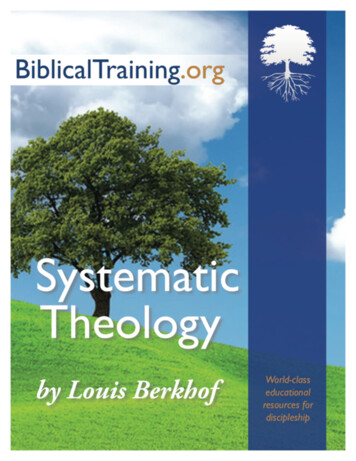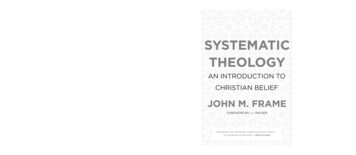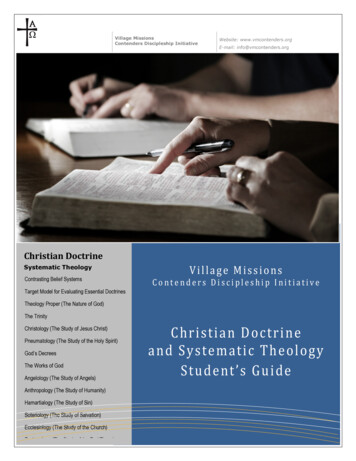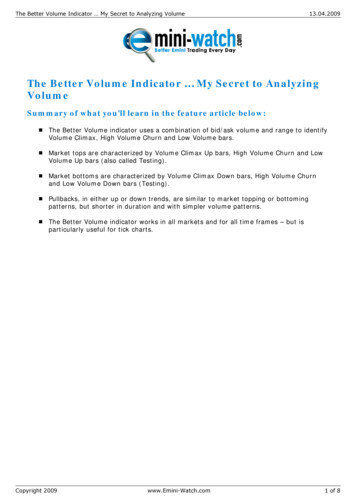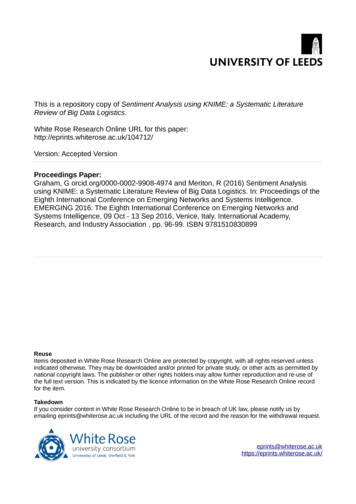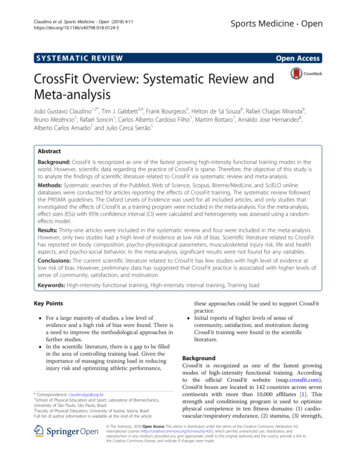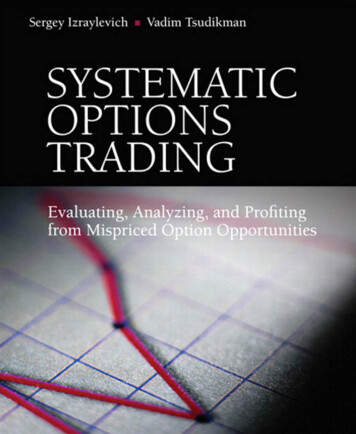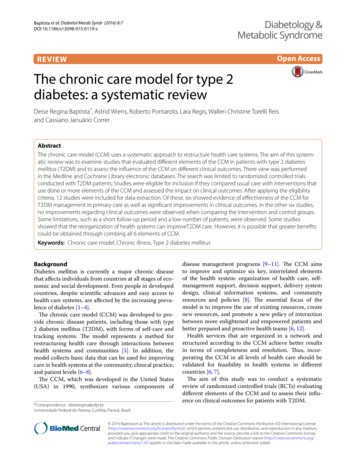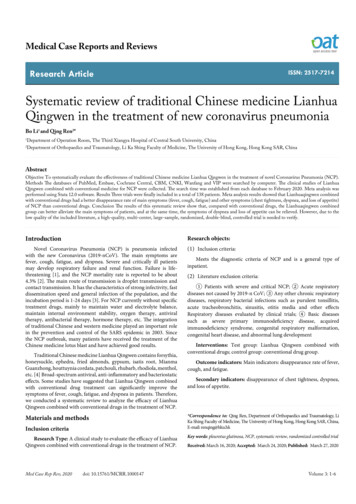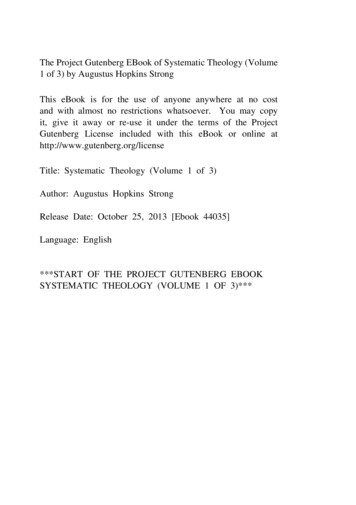
Transcription
The Project Gutenberg EBook of Systematic Theology (Volume1 of 3) by Augustus Hopkins StrongThis eBook is for the use of anyone anywhere at no costand with almost no restrictions whatsoever. You may copyit, give it away or re-use it under the terms of the ProjectGutenberg License included with this eBook or online athttp://www.gutenberg.org/licenseTitle: Systematic Theology (Volume 1 of 3)Author: Augustus Hopkins StrongRelease Date: October 25, 2013 [Ebook 44035]Language: English***START OF THE PROJECT GUTENBERG EBOOKSYSTEMATIC THEOLOGY (VOLUME 1 OF 3)***
Systematic TheologyA Compendium and Commonplace-BookDesigned For The Use Of Theological StudentsByAugustus Hopkins Strong, D.D., LL.D.President and Professor of Biblical Theology in theRochester Theological SeminaryRevised and EnlargedIn Three VolumesVolume 1The Doctrine of GodThe Judson PressPhiladelphia, Boston, Chicago, St. Louis, Los Angeles,Kansas City, Seattle, Toronto1907
ContentsPreface . . . . . . . . . . . . . . . . . . . . . . . . . . . . 3Part I. Prolegomena. . . . . . . . . . . . . . . . . . . . . . 9Chapter I. Idea Of Theology. . . . . . . . . . . . . . . 9I. Definition of Theology. . . . . . . . . . . . . . 9II. Aim of Theology. . . . . . . . . . . . . . . . 10III. Possibility of Theology. . . . . . . . . . . . . 12IV. Necessity of Theology. . . . . . . . . . . . . 41V. Relation of Theology to Religion. . . . . . . . 50Chapter II. Material of Theology. . . . . . . . . . . . . 61I. Sources of Theology. . . . . . . . . . . . . . . 61II. Limitations of Theology. . . . . . . . . . . . . 82III. Relations of Material to Progress in Theology. 86Chapter III. Method Of Theology. . . . . . . . . . . . 90I. Requisites to the study of Theology. . . . . . . 90II. Divisions of Theology. . . . . . . . . . . . . . 96III. History of Systematic Theology. . . . . . . . 103IV. Order of Treatment in Systematic Theology. . 117V. Text-Books in Theology. . . . . . . . . . . . 119Part II. The Existence Of God. . . . . . . . . . . . . . . . 121Chapter I. Origin Of Our Idea Of God's Existence. . . . 121I. First Truths in General. . . . . . . . . . . . . . 124II. The Existence of God a first truth. . . . . . . . 129III. Other Supposed Sources of our Idea of God'sExistence. . . . . . . . . . . . . . . . . . 143IV. Contents of this Intuition. . . . . . . . . . . . 154Chapter II. Corroborative Evidences Of God's Existence.162I. The Cosmological Argument, or Argumentfrom Change in Nature. . . . . . . . . . . 166
ivSystematic Theology (Volume 1 of 3)II. The Teleological Argument, or Argumentfrom Order and Useful Collocation inNature. . . . . . . . . . . . . . . . . . .III. The Anthropological Argument, or Argumentfrom Man's Mental and Moral Nature. . .IV. The Ontological Argument, or Argumentfrom our Abstract and Necessary Ideas. .Chapter III. Erroneous Explanations, And Conclusion.I. Materialism. . . . . . . . . . . . . . . . . . . .II. Materialistic Idealism. . . . . . . . . . . . . .III. Idealistic Pantheism. . . . . . . . . . . . . .IV. Ethical Monism. . . . . . . . . . . . . . . .Part III. The Scriptures A Revelation From God. . . . . . .Chapter I. Preliminary Considerations. . . . . . . . . .I. Reasons a priori for expecting a Revelationfrom God. . . . . . . . . . . . . . . . . .II. Marks of the Revelation man may expect. . . .III. Miracles, as attesting a Divine Revelation. . .IV. Prophecy as Attesting a Divine Revelation. .V. Principles of Historical Evidence applicableto the Proof of a Divine Revelation. . . .Chapter II. Positive Proofs That The Scriptures Are ADivine Revelation. . . . . . . . . . . . . . . . .I. Genuineness of the Christian Documents. . . .II. Credibility of the Writers of the Scriptures. . .III. The Supernatural Character of the ScriptureTeaching. . . . . . . . . . . . . . . . . .IV. The Historical Results of the Propagation ofScripture Doctrine. . . . . . . . . . . . .Chapter III. Inspiration Of The Scriptures. . . . . . . .I. Definition of Inspiration. . . . . . . . . . . . .II. Proof of Inspiration. . . . . . . . . . . . . . .III. Theories of Inspiration. . . . . . . . . . . . 28391396433445445450460
vIV. The Union of the Divine and Human Elements in Inspiration. . . . . . . . . . . .V. Objections to the Doctrine of Inspiration. . . .Part IV. The Nature, Decrees, And Works Of God. . . . .Chapter I. The Attributes Of God. . . . . . . . . . . .I. Definition of the term Attributes. . . . . . . . .II. Relation of the divine Attributes to the divineEssence. . . . . . . . . . . . . . . . . . .III. Methods of determining the divine Attributes.IV. Classification of the Attributes. . . . . . . . .V. Absolute or Immanent Attributes. . . . . . . .VI. Relative or Transitive Attributes. . . . . . . .VII. Rank and Relations of the several Attributes.Chapter II. Doctrine Of The Trinity. . . . . . . . . . .I. In Scriptures there are Three who are recognized as God. . . . . . . . . . . . . . . .II. These Three are so described in Scripture thatwe are compelled to conceive of them asdistinct Persons. . . . . . . . . . . . . .III. This Tripersonality of the Divine Nature isnot merely economic and temporal, butis immanent and eternal. . . . . . . . . .IV. This Tripersonality is not Tritheism; for,while there are three Persons, there is butone Essence. . . . . . . . . . . . . . . .V. The Three Persons, Father, Son, and HolySpirit, are equal. . . . . . . . . . . . . .VI. Inscrutable, yet not self-contradictory, thisDoctrine furnishes the Key to all otherDoctrines. . . . . . . . . . . . . . . . . .Chapter III. The Decrees Of God. . . . . . . . . . . . .I. Definition of Decrees. . . . . . . . . . . . . .II. Proof of the Doctrine of Decrees. . . . . . . .III. Objections to the Doctrine of Decrees. . . . 66789810810814825
viSystematic Theology (Volume 1 of 3)IV. Concluding Remarks. . . . . . . . . . . . . . 844
[Transcriber's Note: The above cover image was produced bythe submitter at Distributed Proofreaders, and is being placedinto the public domain.][v]
Christo Deo Salvatori.“THE EYE SEES ONLY THAT WHICH IT BRINGS WITH IT THE POWEROF SEEING.”—Cicero.“OPEN THOU MINE EYES, THAT I MAY BEHOLD WONDROUS THINGSOUT OF THY LAW.”—Psalm 119:18.“FOR WITH THEE IS THE FOUNTAIN OF LIFE: IN THY LIGHT SHALLWE SEE LIGHT.”—Psalm 36:9.“FOR WE KNOW IN PART, AND WE PROPHESY IN PART; BUT WHENTHAT WHICH IS PERFECT IS COME, THAT WHICH IS IN PART SHALL BEDONE AWAY.”—1 Cor. 13:9, 10.[vii]
PrefaceThe present work is a revision and enlargement of my “SystematicTheology,” first published in 1886. Of the original workthere have been printed seven editions, each edition embodyingsuccessive corrections and supposed improvements. During thetwenty years which have intervened since its first publication Ihave accumulated much new material, which I now offer to thereader. My philosophical and critical point of view meantime hasalso somewhat changed. While I still hold to the old doctrines,I interpret them differently and expound them more clearly,because I seem to myself to have reached a fundamental truthwhich throws new light upon them all. This truth I have triedto set forth in my book entitled “Christ in Creation,” and to thatbook I refer the reader for further information.That Christ is the one and only Revealer of God, in nature, inhumanity, in history, in science, in Scripture, is in my judgmentthe key to theology. This view implies a monistic and idealisticconception of the world, together with an evolutionary ideaas to its origin and progress. But it is the very antidote topantheism, in that it recognizes evolution as only the method ofthe transcendent and personal Christ, who fills all in all, and whomakes the universe teleological and moral from its centre to itscircumference and from its beginning until now.Neither evolution nor the higher criticism has any terrors toone who regards them as parts of Christ's creating and educatingprocess. The Christ in whom are hid all the treasures of wisdomand knowledge himself furnishes all the needed safeguards andlimitations. It is only because Christ has been forgotten thatnature and law have been personified, that history has beenregarded as unpurposed development, that Judaism has been[viii]
4[ix]Systematic Theology (Volume 1 of 3)referred to a merely human origin, that Paul has been thought tohave switched the church off from its proper track even beforeit had gotten fairly started on its course, that superstition andillusion have come to seem the only foundation for the sacrificesof the martyrs and the triumphs of modern missions. I believe inno such irrational and atheistic evolution as this. I believe ratherin him in whom all things consist, who is with his people even tothe end of the world, and who has promised to lead them into allthe truth.Philosophy and science are good servants of Christ, but theyare poor guides when they rule out the Son of God. As I reachmy seventieth year and write these words on my birthday, I amthankful for that personal experience of union with Christ whichhas enabled me to see in science and philosophy the teachingof my Lord. But this same personal experience has made meeven more alive to Christ's teaching in Scripture, has made merecognize in Paul and John a truth profounder than that disclosedby any secular writers, truth with regard to sin and atonementfor sin, that satisfies the deepest wants of my nature and that isself-evidencing and divine.I am distressed by some common theological tendencies ofour time, because I believe them to be false to both science andreligion. How men who have ever felt themselves to be lostsinners and who have once received pardon from their crucifiedLord and Savior can thereafter seek to pare down his attributes,deny his deity and atonement, tear from his brow the crown ofmiracle and sovereignty, relegate him to the place of a merelymoral teacher who influences us only as does Socrates by wordsspoken across a stretch of ages, passes my comprehension. Hereis my test of orthodoxy: Do we pray to Jesus? Do we call uponthe name of Christ, as did Stephen and all the early church? Ishe our living Lord, omnipresent, omniscient, omnipotent? Ishe divine only in the sense in which we are divine, or is he theonly-begotten Son, God manifest in the flesh, in whom is all the
Preface5fulness of the Godhead bodily? What think ye of the Christ? isstill the critical question, and none are entitled to the name ofChristian who, in the face of the evidence he has furnished us,cannot answer the question aright.Under the influence of Ritschl and his Kantian relativism,many of our teachers and preachers have swung off into apractical denial of Christ's deity and of his atonement. We seemupon the verge of a second Unitarian defection, that will breakup churches and compel secessions, in a worse manner than didthat of Channing and Ware a century ago. American Christianityrecovered from that disaster only by vigorously asserting theauthority of Christ and the inspiration of the Scriptures. We needa new vision of the Savior like that which Paul saw on the way toDamascus and John saw on the isle of Patmos, to convince us thatJesus is lifted above space and time, that his existence antedatedcreation, that he conducted the march of Hebrew history, thathe was born of a virgin, suffered on the cross, rose from thedead, and now lives forevermore, the Lord of the universe, theonly God with whom we have to do, our Savior here and ourJudge hereafter. Without a revival of this faith our churcheswill become secularized, mission enterprise will die out, and thecandlestick will be removed out of its place as it was with theseven churches of Asia, and as it has been with the apostatechurches of New England.I print this revised and enlarged edition of my “SystematicTheology,” in the hope that its publication may do somethingto stem this fast advancing tide, and to confirm the faith ofGod's elect. I make no doubt that the vast majority of Christiansstill hold the faith that was once for all delivered to the saints,and that they will sooner or later separate themselves fromthose who deny the Lord who bought them. When the enemycomes in like a flood, the Spirit of the Lord will raise up astandard against him. I would do my part in raising up such astandard. I would lead others to avow anew, as I do now, in[x]
6Systematic Theology (Volume 1 of 3)spite of the supercilious assumptions of modern infidelity, myfirm belief, only confirmed by the experience and reflection of ahalf-century, in the old doctrines of holiness as the fundamentalattribute of God, of an original transgression and sin of the wholehuman race, in a divine preparation in Hebrew history for man'sredemption, in the deity, preëxistence, virgin birth, vicariousatonement and bodily resurrection of Jesus Christ our Lord, andin his future coming to judge the quick and the dead. I believethat these are truths of science as well as truths of revelation; thatthe supernatural will yet be seen to be most truly natural; and thatnot the open-minded theologian but the narrow-minded scientistwill be obliged to hide his head at Christ's coming.[xi]The present volume, in its treatment of Ethical Monism,Inspiration, the Attributes of God, and the Trinity, contains anantidote to most of the false doctrine which now threatens thesafety of the church. I desire especially to call attention tothe section on Perfection, and the Attributes therein involved,because I believe that the recent merging of Holiness in Love,and the practical denial that Righteousness is fundamental inGod's nature, are responsible for the utilitarian views of law andthe superficial views of sin which now prevail in some systems oftheology. There can be no proper doctrine of the atonement andno proper doctrine of retribution, so long as Holiness is refused itspreëminence. Love must have a norm or standard, and this normor standard can be found only in Holiness. The old convictionof sin and the sense of guilt that drove the convicted sinner tothe cross are inseparable from a firm belief in the self-affirmingattribute of God as logically prior to and as conditioning theself-communicating attribute. The theology of our day needsa new view of the Righteous One. Such a view will make itplain that God must be reconciled before man can be saved, andthat the human conscience can be pacified only upon conditionthat propitiation is made to the divine Righteousness. In thisvolume I propound what I regard as the true Doctrine of God,
Preface7because upon it will be based all that follows in the volumes onthe Doctrine of Man, and the Doctrine of Salvation.The universal presence of Christ, the Light that lighteth everyman, in heathen as well as in Christian lands, to direct or overruleall movements of the human mind, gives me confidence that therecent attacks upon the Christian faith will fail of their purpose. Itbecomes evident at last that not only the outworks are assaulted,but the very citadel itself. We are asked to give up all belief inspecial revelation. Jesus Christ, it is said, has come in the fleshprecisely as each one of us has come, and he was before Abrahamonly in the same sense that we were. Christian experience knowshow to characterize such doctrine so soon as it is clearly stated.And the new theology will be of use in enabling even ordinarybelievers to recognize soul-destroying heresy even under themask of professed orthodoxy.I make no apology for the homiletical element in my book.To be either true or useful, theology must be a passion. Pectusest quod theologum facit, and no disdainful cries of “PectoralTheology!” shall prevent me from maintaining that the eyes ofthe heart must be enlightened in order to perceive the truth ofGod, and that to know the truth it is needful to do the truth.Theology is a science which can be successfully cultivated onlyin connection with its practical application. I would therefore,in every discussion of its principles, point out its relations toChristian experience, and its power to awaken Christian emotionsand lead to Christian decisions. Abstract theology is not reallyscientific. Only that theology is scientific which brings thestudent to the feet of Christ.I would hasten the day when in the name of Jesus every kneeshall bow. I believe that, if any man serve Christ, him the Fatherwill honor, and that to serve Christ means to honor him as I honorthe Father. I would not pride myself that I believe so little, butrather that I believe so much. Faith is God's measure of a man.Why should I doubt that God spoke to the fathers through the[xii]
8Systematic Theology (Volume 1 of 3)prophets? Why should I think it incredible that God should raisethe dead? The things that are impossible with men are possiblewith God. When the Son of man comes, shall he find faith onthe earth? Let him at least find faith in us who profess to behis followers. In the conviction that the present darkness is buttemporary and that it will be banished by a glorious sunrising, Igive this new edition of my “Theology” to the public with theprayer that whatever of good seed is in it may bring forth fruit,and that whatever plant the heavenly Father has not planted maybe rooted up.ROCHESTER THEOLOGICAL SEMINARY,ROCHESTER, N. Y., AUGUST 3, 1906.[001]
Part I. Prolegomena.Chapter I. Idea Of Theology.I. Definition of Theology.Theology is the science of God and of the relations between Godand the universe.Though the word “theology” is sometimes employed indogmatic writings to designate that single department ofthe science which treats of the divine nature and attributes,prevailing usage, since Abelard (A. D. 1079-1142) entitled hisgeneral treatise “Theologia Christiana,” has included underthat term the whole range of Christian doctrine. Theology,therefore, gives account, not only of God, but of those relationsbetween God and the universe in view of which we speak ofCreation, Providence and Redemption.John the Evangelist is called by the Fathers “thetheologian,” because he most fully treats of the internalrelations of the persons of the Trinity. Gregory Nazianzen(328) received this designation because he defended the deityof Christ against the Arians. For a modern instance of thisuse of the term “theology” in the narrow sense, see the titleof Dr. Hodge's first volume: “Systematic Theology, Vol. I:Theology.” But theology is not simply “the science of God,”
10[002]Systematic Theology (Volume 1 of 3)nor even “the science of God and man.” It also gives accountof the relations between God and the universe.If the universe were God, theology would be the onlyscience. Since the universe is but a manifestation of Godand is distinct from God, there are sciences of nature and ofmind. Theology is “the science of the sciences,” not in thesense of including all these sciences, but in the sense of usingtheir results and of showing their underlying ground; (seeWardlaw, Theology, 1:1, 2). Physical science is not a partof theology. As a mere physicist, Humboldt did not need tomention the name of God in his “Cosmos” (but see Cosmos,2:418, where Humboldt says: “Psalm 104 presents an imageof the whole Cosmos”). Bishop of Carlisle: “Science isatheous, and therefore cannot be atheistic.”Only when we consider the relations of finite things toGod, does the study of them furnish material for theology.Anthropology is a part of theology, because man's nature isthe work of God and because God's dealings with man throwlight upon the character of God. God is known through hisworks and his activities. Theology therefore gives accountof these works and activities so far as they come withinour knowledge. All other sciences require theology for theircomplete explanation. Proudhon: “If you go very deeply intopolitics, you are sure to get into theology.” On the definitionof theology, see Luthardt, Compendium der Dogmatik, 1:2;Blunt, Dict. Doct. and Hist. Theol., art.: Theology; H. B.Smith, Introd. to Christ. Theol., 44; cf. Aristotle, Metaph.,10, 7, 4; 11, 6, 4; and Lactantius, De Ira Dei, 11.II. Aim of Theology.The aim of theology is the ascertainment of the facts respectingGod and the relations between God and the universe, and the
II. Aim of Theology.11exhibition of these facts in their rational unity, as connected partsof a formulated and organic system of truth.In defining theology as a science, we indicate its aim. Sciencedoes not create; it discovers. Theology answers to thisdescription of a science. It discovers facts and relations,but it does not create them. Fisher, Nature and Methodof Revelation, 141—“Schiller, referring to the ardor ofColumbus's faith, says that if the great discoverer had notfound a continent, he would have created one. But faith is notcreative. Had Columbus not found the land—had there beenno real object answering to his belief—his faith would havebeen a mere fancy.” Because theology deals with objectivefacts, we refuse to define it as “the science of religion”; versusAm. Theol. Rev., 1850:101-126, and Thornwell, Theology,1:139. Both the facts and the relations with which theologyhas to deal have an existence independent of the subjectivemental processes of the theologian.Science is not only the observing, recording, verifying,and formulating of objective facts; it is also the recognitionand explication of the relations between these facts, andthe synthesis of both the facts and the rational principleswhich unite them in a comprehensive, rightly proportioned,and organic system. Scattered bricks and timbers are not ahouse; severed arms, legs, heads and trunks from a dissectingroom are not living men; and facts alone do not constitutescience. Science facts relations; Whewell, Hist. InductiveSciences, I, Introd., 43—“There may be facts without science,as in the knowledge of the common quarryman; there may bethought without science, as in the early Greek philosophy.”A. MacDonald: “The a priori method is related to the aposteriori as the sails to the ballast of the boat: the morephilosophy the better, provided there are a sufficient numberof facts; otherwise, there is danger of upsetting the craft.”President Woodrow Wilson: “ ‘Give us the facts’ is thesharp injunction of our age to its historians . But facts of
12Systematic Theology (Volume 1 of 3)themselves do not constitute the truth. The truth is abstract,not concrete. It is the just idea, the right revelation, of whatthings mean. It is evoked only by such arrangements andorderings of facts as suggest meanings.” Dove, Logic of theChristian Faith, 14—“The pursuit of science is the pursuit ofrelations.” Everett, Science of Thought, 3—“Logy” (e. g.,in “theology”), from »y³¿Â, word reason, expression thought, fact idea; cf. John 1:1—“In the beginning was theWord.”As theology deals with objective facts and their relations,so its arrangement of these facts is not optional, but isdetermined by the nature of the material with which it deals.A true theology thinks over again God's thoughts and bringsthem into God's order, as the builders of Solomon's templetook the stones already hewn, and put them into the places forwhich the architect had designed them; Reginald Heber: “Nohammer fell, no ponderous axes rung; Like some tall palm,the mystic fabric sprung.” Scientific men have no fear thatthe data of physics will narrow or cramp their intellects; nomore should they fear the objective facts which are the data oftheology. We cannot make theology, any more than we canmake a law of physical nature. As the natural philosopher is“Naturæ minister et interpres,” so the theologian is the servantand interpreter of the objective truth of God. On the Idea ofTheology as a System, see H. B. Smith, Faith and Philosophy,126-166.III. Possibility of Theology.The possibility of theology has a threefold ground: 1. In theexistence of a God who has relations to the universe; 2. In thecapacity of the human mind for knowing God and certain ofthese relations; and 3. In the provision of means by which God
1. The existence of a God.13is brought into actual contact with the mind, or in other words,in the provision of a revelation.Any particular science is possible only when three conditionscombine, namely, the actual existence of the object withwhich the science deals, the subjective capacity of thehuman mind to know that object, and the provision of definitemeans by which the object is brought into contact with themind. We may illustrate the conditions of theology fromselenology—the science, not of “lunar politics,” which JohnStuart Mill thought so vain a pursuit, but of lunar physics.Selenology has three conditions: 1. the objective existence ofthe moon; 2. the subjective capacity of the human mind toknow the moon; and 3. the provision of some means (e. g.,the eye and the telescope) by which the gulf between man andthe moon is bridged over, and by which the mind can comeinto actual cognizance of the facts with regard to the moon.1. The existence of a God.In the existence of a God who has relations to the universe.—Ithas been objected, indeed, that since God and these relations areobjects apprehended only by faith, they are not proper objects ofknowledge or subjects for science. We reply:A. Faith is knowledge, and a higher sort ofknowledge.—Physical science also rests upon faith—faith in ourown existence, in the existence of a world objective and externalto us, and in the existence of other persons than ourselves; faith inour primitive convictions, such as space, time, cause, substance,design, right; faith in the trustworthiness of our faculties andin the testimony of our fellow men. But physical science isnot thereby invalidated, because this faith, though unlike senseperception or logical demonstration, is yet a cognitive act of thereason, and may be defined as certitude with respect to mattersin which verification is unattainable.[003]
14Systematic Theology (Volume 1 of 3)The objection to theology thus mentioned and answeredis expressed in the words of Sir William Hamilton,Metaphysics, 44, 531—“Faith—belief—is the organ by whichwe apprehend what is beyond our knowledge.” But scienceis knowledge, and what is beyond our knowledge cannot bematter for science. Pres. E. G. Robinson says well, thatknowledge and faith cannot be severed from one another,like bulkheads in a ship, the first of which may be crushedin, while the second still keeps the vessel afloat. The mindis one,—“it cannot be cut in two with a hatchet.” Faith isnot antithetical to knowledge,—it is rather a larger and morefundamental sort of knowledge. It is never opposed to reason,but only to sight. Tennyson was wrong when he wrote: “Wehave but faith: we cannot know; For knowledge is of thingswe see” (In Memoriam, Introduction). This would makesensuous phenomena the only objects of knowledge. Faith insupersensible realities, on the contrary, is the highest exerciseof reason.Sir William Hamilton consistently declares that the highestachievement of science is the erection of an altar “To theUnknown God.” This, however, is not the representation ofScripture. Cf. John 17:3—“this is life eternal, that they shouldknow thee, the only true God”; and Jer. 9:24—“let him thatglorieth glory in that he hath understanding and knowethme.” For criticism of Hamilton, see H. B. Smith, Faithand Philosophy, 297-336. Fichte: “We are born in faith.”Even Goethe called himself a believer in the five senses.Balfour, Defence of Philosophic Doubt, 277-295, showsthat intuitive beliefs in space, time, cause, substance, right,are presupposed in the acquisition of all other knowledge.Dove, Logic of the Christian Faith, 14—“If theology is to beoverthrown because it starts from some primary terms andpropositions, then all other sciences are overthrown with it.”Mozley, Miracles, defines faith as “unverified reason.” SeeA. H. Strong, Philosophy and Religion, 19-30.
1. The existence of a God.15B. Faith is a knowledge conditioned by holy affection.—Thefaith which apprehends God's being and working is not opinionor imagination. It is certitude with regard to spiritual realities,upon the testimony of our rational nature and upon the testimonyof God. Its only peculiarity as a cognitive act of the reason is thatit is conditioned by holy affection. As the science of æstheticsis a product of reason as including a power of recognizingbeauty practically inseparable from a love for beauty, and as thescience of ethics is a product of reason as including a power ofrecognizing the morally right practically inseparable from a lovefor the morally right, so the science of theology is a product ofreason, but of reason as including a power of recognizing Godwhich is practically inseparable from a love for God.We here use the term “reason” to signify the mind's wholepower of knowing. Reason in this sense includes states of thesensibility, so far as they are indispensable to knowledge. Wecannot know an orange by the eye alone; to the understandingof it, taste is as necessary as sight. The mathematics of soundcannot give us an understanding of music; we need also amusical ear. Logic alone cannot demonstrate the beauty ofa sunset, or of a noble character; love for the beautiful andthe right precedes knowledge of the beautiful and the right.Ullman draws attention to the derivation of sapientia, wisdom,from sap re, to taste. So we cannot know God by intellectalone; the heart must go with the intellect to make knowledgeof divine things possible. “Human things,” said Pascal, “needonly to be known, in order to be loved; but divine things mustfirst be loved, in order to be known.” “This [religious] faithof the intellect,” said Kant, “is founded on the assumption ofmoral tempers.” If one were utterly indifferent to moral laws,the philosopher continues, even then religious truths “wouldbe supported by strong arguments from anal
Oct 25, 2013 · The Project Gutenberg EBook of Systematic Theology (Volume 1 of 3) by Augustus Hopkins Strong This eBook is for the use of anyone anywhere at no cost and with almo

